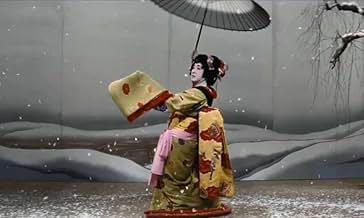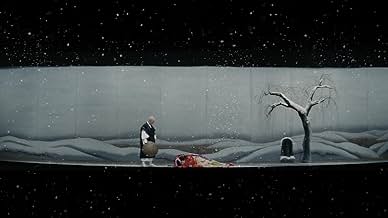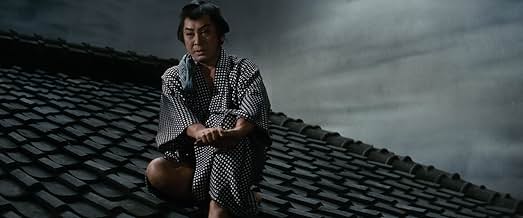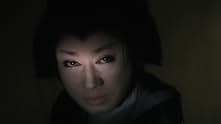IMDb रेटिंग
7.3/10
3.1 हज़ार
आपकी रेटिंग
अपनी भाषा में प्लॉट जोड़ेंYukinojo, a Kabuki actor, seeks revenge by destroying the three men who caused the deaths of his parents. Also involved are the daughter of one of Yukinojo's targets, two master thieves, and... सभी पढ़ेंYukinojo, a Kabuki actor, seeks revenge by destroying the three men who caused the deaths of his parents. Also involved are the daughter of one of Yukinojo's targets, two master thieves, and a swordsman who himself is out to kill Yukinojo.Yukinojo, a Kabuki actor, seeks revenge by destroying the three men who caused the deaths of his parents. Also involved are the daughter of one of Yukinojo's targets, two master thieves, and a swordsman who himself is out to kill Yukinojo.
- पुरस्कार
- कुल 1 जीत
फ़ीचर्ड समीक्षाएं
This is an Ichikawa film so expect anything short of sheer visual awesomeness and yer a fool. Impeccably staged, superbly lighted and shot with remarkable flair for atmosphere, this one deserves a watch on its technical cinematic merits alone. The plot relates the adventures of a Kabuki stage actor plotting revenge against those who disgraced and drove his parents to madness and suicide, apparently a readaptation of a 30's movie. Everything is very campy though and the protagonist, a feminine man with a pathetic croaky voice dressed in woman's clothes, is bound to induce a fair amount of groans. Obviously related to the material at hand, Ichikawa stages and shoots the movie in a stylized theatrical manner. The intentional artificiality of sets and lighting perfectly mirrors that. Perhaps the best thing about it is the use of colour, with bright reds, yellows and whites offering a vibrant counterbalance to the almost complete darkness of other set-pieces. All in all, I didn't find the dramaturgy of the film very involving and I suspect Ichikawa didn't care for it either. From a technical standpoint however it is certainly commendable.
There are some truly beautiful scenes here, particularly the marvellous use of widescreen in the colourful kabuki sequences and Kazuoha Segawa is faultless in the duel central role. He plays dressed as a woman on the stage but seems also to live out his life this way and he also plays his thieving side-kick. Apparently played for laughs throughout it is difficult for a non Japanese to fully appreciate much of the subtlety and Shakespearean style play on words. Indeed, for me, the whole is rather too mannered and stagey. There is much blurring between stage and 'real life' which some find charming but I tend to find rather confusing and lifeless.
I have seen several hundred Japanese films but am far from an expert on these movies. After all, I am not Japanese and don't always understand some of the subtleties in the pictures. For example, in "An Actor's Revenge", the main character (Yukinojo) is a man who performs as a woman on stage--that I knew and understood. However, he maintained this persona off-stage as well and I wondered just how unusual this was--did other male Kabuki actors also maintain this persona when they weren't acting? If you can answer this question, I would love to hear from you.
The film begins at a Kabuki performance. Yukinojo has recently come to Edo (Tokyo) and has been planning revenge on three scoundrels for many years. It seemed these wicked men were responsible for destroying his family and he sees himself as the instrument of revenge--much like the character in another famous Japanese film, "Lady Snowblood". However, he doesn't want to just stab them--he wants to have them linger and give him a chance to revel in their destruction. Part of it, however, depends on using the daughter of one of these wicked men--and the lady is innocent of causing any harm to anyone. What's Yukinojo to do? And, what is he to do when several ancillary characters blunder or wander into his plans?
There were several things I liked about the film. First, the various thieves who were no necessary to the film helped to give the film greater depth and, in an odd way, fun. Second, the film was made in many ways like the entire production was ALL part of a play. Often, using interesting lighting and sets, it looked as if the line between the off-stage and on-stage was often blurred. It made the film truly memorable. Overall, well worth seeing and gloriously artistic.
The film begins at a Kabuki performance. Yukinojo has recently come to Edo (Tokyo) and has been planning revenge on three scoundrels for many years. It seemed these wicked men were responsible for destroying his family and he sees himself as the instrument of revenge--much like the character in another famous Japanese film, "Lady Snowblood". However, he doesn't want to just stab them--he wants to have them linger and give him a chance to revel in their destruction. Part of it, however, depends on using the daughter of one of these wicked men--and the lady is innocent of causing any harm to anyone. What's Yukinojo to do? And, what is he to do when several ancillary characters blunder or wander into his plans?
There were several things I liked about the film. First, the various thieves who were no necessary to the film helped to give the film greater depth and, in an odd way, fun. Second, the film was made in many ways like the entire production was ALL part of a play. Often, using interesting lighting and sets, it looked as if the line between the off-stage and on-stage was often blurred. It made the film truly memorable. Overall, well worth seeing and gloriously artistic.
This movie is quite unlike any other I have ever seen. Oddly, one of the strangest things about it is the lighting. Much of the action occurs in the dark with just spotlights on the actors. This gives it a very stagy surreal feel. It takes place in historic Japan where people demonstrate their wealth not by cramming rooms with furniture, but by having gigantic carpeted empty rooms, with nothing in them but perhaps a stool. I found these starkly elegant and immensely pleasing. The exotic are things that come from Holland. It is fun looking through the Japanese side of the lens of history.
Characters often pose perfectly still for minutes an a time while some other character does something or narrates.
Yuki is a male who plays female roles in traditional Kabuki theatre. He always appears in elaborate female clothes. He is has a double chin. He is quite homely, both as male and female, but for reasons never satisfactorily explained seems irresistible to both males and females even though there are many other characters of either sex much better looking. He is also skilled at sword fighting. He is preposterously polite, effusive and self-effacing. The basic plot is seeking revenge for horrible things three men did to his parents. He subtly manipulates his enemies to do each other in.
A kabuki actor who wanders around is drag offstage does not seem to raise any eyebrows, except for people who don't realise he as an actor. Nobody seems to be the tiniest bit embarrassed by their attraction to him, perhaps annoyed or frustrated, but not ashamed.
The plot is operatic, very high emotions and drastic crazy behaviour. Kabuki theatre is definitely an acquired taste, but this movie is quite accessible and anything but boring.
There is one actor who plays two major roles. They give you a hint who it is near the end of the movie. See if you can pick it out earlier.
Characters often pose perfectly still for minutes an a time while some other character does something or narrates.
Yuki is a male who plays female roles in traditional Kabuki theatre. He always appears in elaborate female clothes. He is has a double chin. He is quite homely, both as male and female, but for reasons never satisfactorily explained seems irresistible to both males and females even though there are many other characters of either sex much better looking. He is also skilled at sword fighting. He is preposterously polite, effusive and self-effacing. The basic plot is seeking revenge for horrible things three men did to his parents. He subtly manipulates his enemies to do each other in.
A kabuki actor who wanders around is drag offstage does not seem to raise any eyebrows, except for people who don't realise he as an actor. Nobody seems to be the tiniest bit embarrassed by their attraction to him, perhaps annoyed or frustrated, but not ashamed.
The plot is operatic, very high emotions and drastic crazy behaviour. Kabuki theatre is definitely an acquired taste, but this movie is quite accessible and anything but boring.
There is one actor who plays two major roles. They give you a hint who it is near the end of the movie. See if you can pick it out earlier.
10mkiem
Ichikawa supposedly made this movie "to see what cinema could do." He pulls out all the stops and the result is a masterpiece of visual splendor, wit and style that is stunning as well as very entertaining. The story of a man taking revenge against the people who killed his parents is an old cliched melodrama that was assigned to him. But he turns necessity into a virtue by glorifying the kitsch while at the same time keeping an ironic stance. (don't miss a great visual pun involving a gunshot and a crescent moon.)
He uses the widescreen to full effect in adopting the aesthetics of the Kabuki theater. The sheer visual inventiveness of the movie makes for the best kind of eye candy. There are bold splashes of primary colors and dramatic, very theatrical lighting. Some sets are intentionally artificial-looking while others are not. Somehow the two styles don't clash but instead portray the perfect intermingling of theater and cinema. Similarly, the use of jazz and lounge music(!) seems perfectly appropriate.
Hasegawa, the lead actor, played the same role in a previous version of the movie nearly 30 years earlier. A man who acts like a woman, seducing a woman young enough to be his daughter lends a touch of the bizarre which just makes things more interesting. The movie is graced by Ayako Wakao, at the height of her incredible beauty.
He uses the widescreen to full effect in adopting the aesthetics of the Kabuki theater. The sheer visual inventiveness of the movie makes for the best kind of eye candy. There are bold splashes of primary colors and dramatic, very theatrical lighting. Some sets are intentionally artificial-looking while others are not. Somehow the two styles don't clash but instead portray the perfect intermingling of theater and cinema. Similarly, the use of jazz and lounge music(!) seems perfectly appropriate.
Hasegawa, the lead actor, played the same role in a previous version of the movie nearly 30 years earlier. A man who acts like a woman, seducing a woman young enough to be his daughter lends a touch of the bizarre which just makes things more interesting. The movie is graced by Ayako Wakao, at the height of her incredible beauty.
क्या आपको पता है
- ट्रिवियाOriginally designed as a tribute to actor Kazuo Hasegawa, whose 300th film this was. The film was based Teinosuke Kinugasa's Yukinojô henge: Daiippen (1935) which also starred Hasegawa in the same dual role.
- कनेक्शनVersion of Yukinojô henge: Daiippen (1935)
टॉप पसंद
रेटिंग देने के लिए साइन-इन करें और वैयक्तिकृत सुझावों के लिए वॉचलिस्ट करें
- How long is An Actor's Revenge?Alexa द्वारा संचालित
विवरण
- रिलीज़ की तारीख़
- कंट्री ऑफ़ ओरिजिन
- भाषा
- इस रूप में भी जाना जाता है
- An Actor's Revenge
- उत्पादन कंपनी
- IMDbPro पर और कंपनी क्रेडिट देखें
- चलने की अवधि1 घंटा 55 मिनट
- ध्वनि मिश्रण
- पक्ष अनुपात
- 2.35 : 1
इस पेज में योगदान दें
किसी बदलाव का सुझाव दें या अनुपलब्ध कॉन्टेंट जोड़ें































